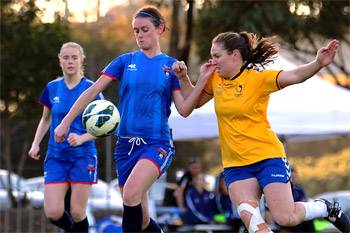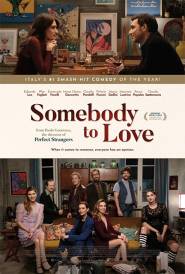David Eland The Community Impact of Football Interview

David Eland The Community Impact of Football Interview
A new report, The Community Impact of Football in NSW, details, for the first time, the economic, health and social contribution of grassroots football. The report's authors, strategy and research consultancy SBP and economic and demographic analysts Street Ryan, estimate the total annual economic contribution of grassroots football in NSW is more than $417 million per annum. The benefit of avoided health costs as a result of grassroots participation in football in NSW is calculated to be $4.5 million per annum which, over the typical playing life of participants, equates to $62.5 million in avoided health costs.
However, the report highlights the fact that a lack of grassroots infrastructure is hindering the sport reaching its true potential, which the researchers calculate at more than $619 million per annum to the NSW community. The report was commissioned jointly by the state's Member Federations, Football NSW and Northern NSW Football.
Football Federation Australia's CEO, Mr. David Gallop welcomed the new report as -groundbreaking'.
'The report plugs a major knowledge gap. We have a good grasp of the contribution the elite competitions make and now, for the first time, we have an accurate picture of the economic, health and community contribution that grassroots football makes. If we extrapolate this NSW data to a national level we can see that grassroots football's contribution to the economy is delivering just over $1 billion per annum to the Australian community. It is a hugely important piece of research because it helps demonstrate with hard data why football is the ideal partner to help governments build vibrant communities," Mr. Gallop said.
The report notes that football is already by far the most popular participation sport in NSW, with more than 365,000 registered participants, encompassing a player base 22 per cent larger than all the other football codes combined. Yet, according to David Eland, CEO Northern NSW Football, the game is suffering more than most sports from a lack of funding for community infrastructure.
'Football is now well and truly the number one mainstream participation sport in NSW. In terms of social inclusion, football is unmatched. It is a sport that is played by all ages, in every community in every corner of the state. We enjoy strong female support, with 64,000 participants, which is almost one-quarter of our registered players, now female.
'We're growing at a faster rate than any other established sport, our registrations are up 15% on last year. That's driven by a combination of the sport's increasing popularity in its own right, helped by the Asian Cup success and our growing population, but a lack of local community infrastructure is seriously hampering our ability to cope with this demand. We have documented reports of clubs turning away players and of women having to change in public toilets simply because of a lack of facilities," Mr. Eland said.
The report says that unlike many other sports in Australia, the participant base is highly reflective of the cultural diversity of the general population and makes a valuable contribution to integrating new migrants.
'Football truly is the world game, so we meld together different ethnic groups and give migrants an easy entry point into their new communities. Parents know that their kids can go straight onto the pitch, they know the rules and can immediately join in," Football NSW CEO, Mr. Eddie Moore said. The Member Federations also recently produced a report, Meeting The Future Needs Of Football in NSW: A Partnership Approach which itemises at a local community level the infrastructure that is necessary if football is to be able to cope with current and future demand.
'Together, these reports demonstrate is there is a huge funding gap. Our primary role is to administer the game efficiently on the football family's behalf so that we can contribute to local infrastructure development, but we need the support of local and state government. No other sport enjoys as much grassroots participation, no other sport is so socially inclusive and no other sport can match football's return to the tax payer, on an economic, health or social basis," Mr. Moore said.
Both reports can be accessed at http://www.footballnsw.com.au/
However, the report highlights the fact that a lack of grassroots infrastructure is hindering the sport reaching its true potential, which the researchers calculate at more than $619 million per annum to the NSW community. The report was commissioned jointly by the state's Member Federations, Football NSW and Northern NSW Football.
Football Federation Australia's CEO, Mr. David Gallop welcomed the new report as -groundbreaking'.
'The report plugs a major knowledge gap. We have a good grasp of the contribution the elite competitions make and now, for the first time, we have an accurate picture of the economic, health and community contribution that grassroots football makes. If we extrapolate this NSW data to a national level we can see that grassroots football's contribution to the economy is delivering just over $1 billion per annum to the Australian community. It is a hugely important piece of research because it helps demonstrate with hard data why football is the ideal partner to help governments build vibrant communities," Mr. Gallop said.
The report notes that football is already by far the most popular participation sport in NSW, with more than 365,000 registered participants, encompassing a player base 22 per cent larger than all the other football codes combined. Yet, according to David Eland, CEO Northern NSW Football, the game is suffering more than most sports from a lack of funding for community infrastructure.
'Football is now well and truly the number one mainstream participation sport in NSW. In terms of social inclusion, football is unmatched. It is a sport that is played by all ages, in every community in every corner of the state. We enjoy strong female support, with 64,000 participants, which is almost one-quarter of our registered players, now female.
'We're growing at a faster rate than any other established sport, our registrations are up 15% on last year. That's driven by a combination of the sport's increasing popularity in its own right, helped by the Asian Cup success and our growing population, but a lack of local community infrastructure is seriously hampering our ability to cope with this demand. We have documented reports of clubs turning away players and of women having to change in public toilets simply because of a lack of facilities," Mr. Eland said.
The report says that unlike many other sports in Australia, the participant base is highly reflective of the cultural diversity of the general population and makes a valuable contribution to integrating new migrants.
'Football truly is the world game, so we meld together different ethnic groups and give migrants an easy entry point into their new communities. Parents know that their kids can go straight onto the pitch, they know the rules and can immediately join in," Football NSW CEO, Mr. Eddie Moore said. The Member Federations also recently produced a report, Meeting The Future Needs Of Football in NSW: A Partnership Approach which itemises at a local community level the infrastructure that is necessary if football is to be able to cope with current and future demand.
'Together, these reports demonstrate is there is a huge funding gap. Our primary role is to administer the game efficiently on the football family's behalf so that we can contribute to local infrastructure development, but we need the support of local and state government. No other sport enjoys as much grassroots participation, no other sport is so socially inclusive and no other sport can match football's return to the tax payer, on an economic, health or social basis," Mr. Moore said.
Both reports can be accessed at http://www.footballnsw.com.au/
Interview with David Eland, CEO of Northern NSW Football
Question: What did you learn from The Community Impact of Football in NSW report
David Eland: For the first time, we now have empirical data that measures the economic, health and social contribution that grassroots football (soccer) makes in NSW. We make a contribution of more than $417 million per annum but we can make a much bigger contribution if we can provide the facilities we need to cater for the numbers who want to play grassroots football. If we can do that, we can contribute an estimated $619 million a year to the community.
Question: What surprised you about The Community Impact of Football in NSW report?
David Eland: Football NSW and Northern NSW Football commissioned this report because we already knew, as the biggest participant sport in the state with 365,000 registered participants which is 22 percent more than all other football codes combined, that investment in football would have economic, health and social benefits for the entire community. While there's been nothing in the report that surprises us there is confirmation and numerical evidence that funding for football facilities is not only needed but can have positive impacts that transcend football.
Question: Can you explain the social contribution of grassroots football?
David Eland: The economic contribution is mostly made up of things like spending by local clubs on coaching, referees, medical support and expenditure by players on things like sports gear. The health dividend comes about because many men and women play football well into their adult lives and this delivers important benefits in terms of reduced levels of cardiovascular disease and many other chronic illnesses and conditions. Being active in a team sport like ours also reduces the risk of mental health problems which is a big issue, particularly for young people. From the perspective of social cohesion, it is a well-established fact that what the experts call 'indicators of social capital" are higher amongst people involved with grassroots sports than those who aren't. It means that those who play football, or are involved as volunteers and officials, tend to have stronger personal networks, engage better and more often within their communities and tend to be more trusted.
Question: Can you talk about how this impacts women in football?
David Eland: That's one of the real strengths of our sport, the fact that so many women enjoy playing it. We're seeing a boom in registrations and women are at the forefront. We already have 64,000 women playing the game in NSW and that creates a unique challenge for us. For example, only 43 per cent of grounds have either female or unisex change rooms. We expect to see a further spike in female participation with the Matilda's playing in the FIFA World Cup finals in June and July. So a key task for us is to make sure we get the money needed for more grounds and decent facilities for both women and men.
Question: Why do you believe football is growing at a faster rate than any other established sport?
David Eland: You talk to fans and they'll tell you it genuinely is the beautiful game and people can, and do, play well into their fifties and sixties. And because it appeals to every ethnic group, there's no group that feels excluded. Our appeal to women is a key factor in our faster growth rate with 86 per cent of our clubs now catering for female players.
Question: How has the Asian Cup helped with this increase?
David Eland: The Australian public really embraced the Asian Cup so the profile of the game skyrocketed. And there is no doubt about it, the Socceroos' win really did inspire a lot of people, boys, girls and adults to get their boots on. For example, registrations for 2015 are up 15 per cent on last year in Northern NSW.
Question: What tips do you have for females wanting to get involved in football?
David Eland: You'll find your local football club really welcoming. Don't worry if you don't know anyone to go along with you, everyone loves to see a new face. To find a club near you, just visit the website of your relevant state football federation and you'll be able to get the details of clubs near you.
Question: How does football meld together different ethnic groups?
David Eland: It truly is the world game. If it isn't the biggest sport in a particular country, it will be one of the most popular. When migrants arrive in Australia they can immediately embrace the game, it is familiar, they can bring their kids along to the local club and they know the rules of the game will be the same, it just makes the whole business of fitting in that much easier. The vast majority of grassroots football clubs are reflective of the rich diversity that makes up Australian society.
Interview by Brooke Hunter
David Eland: For the first time, we now have empirical data that measures the economic, health and social contribution that grassroots football (soccer) makes in NSW. We make a contribution of more than $417 million per annum but we can make a much bigger contribution if we can provide the facilities we need to cater for the numbers who want to play grassroots football. If we can do that, we can contribute an estimated $619 million a year to the community.
Question: What surprised you about The Community Impact of Football in NSW report?
David Eland: Football NSW and Northern NSW Football commissioned this report because we already knew, as the biggest participant sport in the state with 365,000 registered participants which is 22 percent more than all other football codes combined, that investment in football would have economic, health and social benefits for the entire community. While there's been nothing in the report that surprises us there is confirmation and numerical evidence that funding for football facilities is not only needed but can have positive impacts that transcend football.
Question: Can you explain the social contribution of grassroots football?
David Eland: The economic contribution is mostly made up of things like spending by local clubs on coaching, referees, medical support and expenditure by players on things like sports gear. The health dividend comes about because many men and women play football well into their adult lives and this delivers important benefits in terms of reduced levels of cardiovascular disease and many other chronic illnesses and conditions. Being active in a team sport like ours also reduces the risk of mental health problems which is a big issue, particularly for young people. From the perspective of social cohesion, it is a well-established fact that what the experts call 'indicators of social capital" are higher amongst people involved with grassroots sports than those who aren't. It means that those who play football, or are involved as volunteers and officials, tend to have stronger personal networks, engage better and more often within their communities and tend to be more trusted.
Question: Can you talk about how this impacts women in football?
David Eland: That's one of the real strengths of our sport, the fact that so many women enjoy playing it. We're seeing a boom in registrations and women are at the forefront. We already have 64,000 women playing the game in NSW and that creates a unique challenge for us. For example, only 43 per cent of grounds have either female or unisex change rooms. We expect to see a further spike in female participation with the Matilda's playing in the FIFA World Cup finals in June and July. So a key task for us is to make sure we get the money needed for more grounds and decent facilities for both women and men.
Question: Why do you believe football is growing at a faster rate than any other established sport?
David Eland: You talk to fans and they'll tell you it genuinely is the beautiful game and people can, and do, play well into their fifties and sixties. And because it appeals to every ethnic group, there's no group that feels excluded. Our appeal to women is a key factor in our faster growth rate with 86 per cent of our clubs now catering for female players.
Question: How has the Asian Cup helped with this increase?
David Eland: The Australian public really embraced the Asian Cup so the profile of the game skyrocketed. And there is no doubt about it, the Socceroos' win really did inspire a lot of people, boys, girls and adults to get their boots on. For example, registrations for 2015 are up 15 per cent on last year in Northern NSW.
Question: What tips do you have for females wanting to get involved in football?
David Eland: You'll find your local football club really welcoming. Don't worry if you don't know anyone to go along with you, everyone loves to see a new face. To find a club near you, just visit the website of your relevant state football federation and you'll be able to get the details of clubs near you.
Question: How does football meld together different ethnic groups?
David Eland: It truly is the world game. If it isn't the biggest sport in a particular country, it will be one of the most popular. When migrants arrive in Australia they can immediately embrace the game, it is familiar, they can bring their kids along to the local club and they know the rules of the game will be the same, it just makes the whole business of fitting in that much easier. The vast majority of grassroots football clubs are reflective of the rich diversity that makes up Australian society.
Interview by Brooke Hunter
MORE





